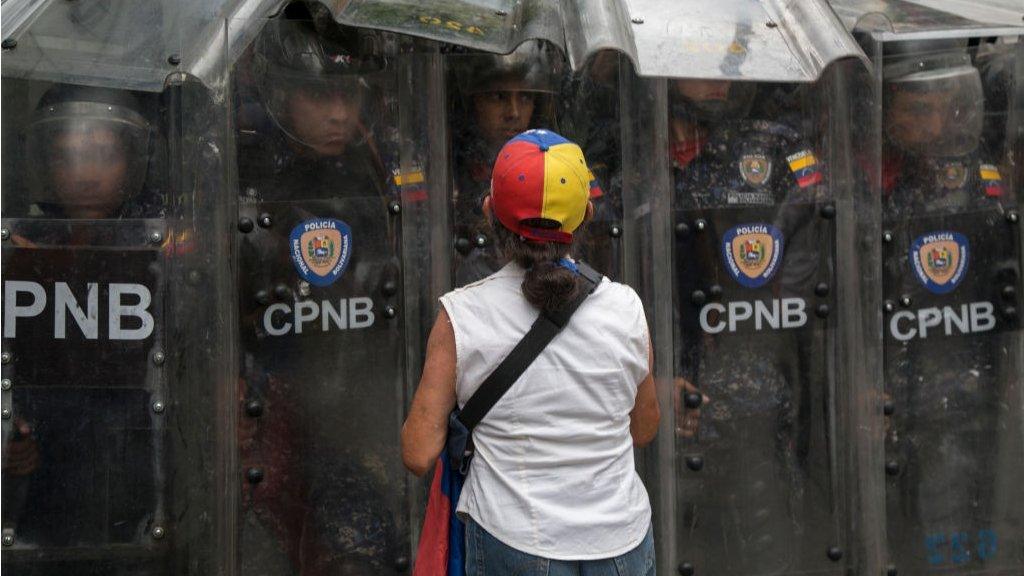Venezuela crisis: Three killed at anti-government protests
- Published
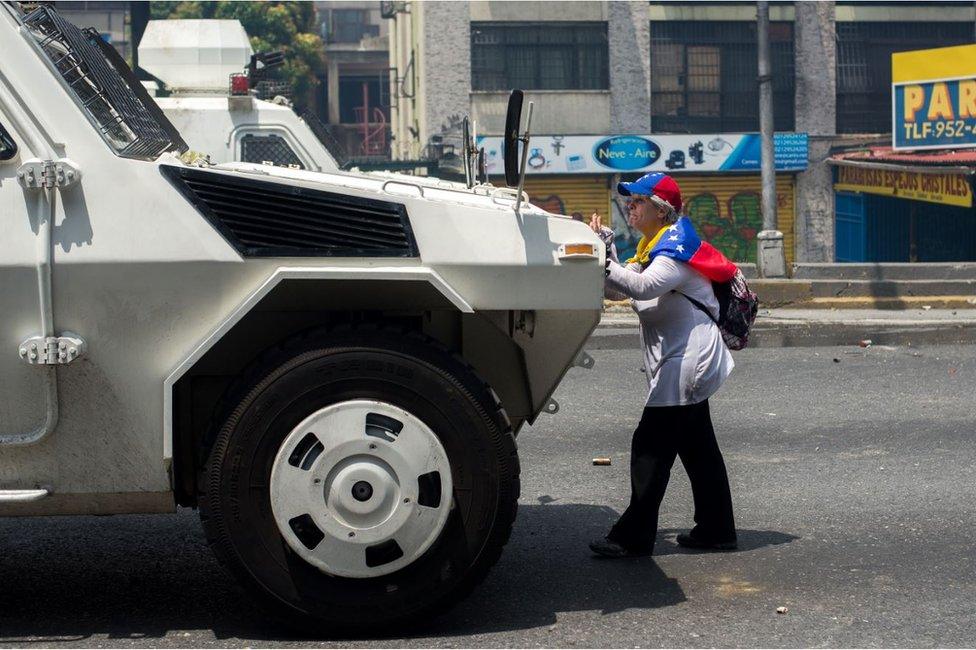
One female protester confronted the security forces head on
At least three people have been killed in Venezuela in protests against the government of President Nicolas Maduro.
A teenager in the capital Caracas and a woman in San Cristobal, near the Colombian border, were shot dead.
A national guardsman was killed south of the capital.
Tens of thousands of people rallied to demand new presidential elections and the release of jailed opposition politicians. Mr Maduro accused the opposition of attacking police.
What happened?
Opposition groups had called on their supporters to take part in anti-government protests across the country on Wednesday.
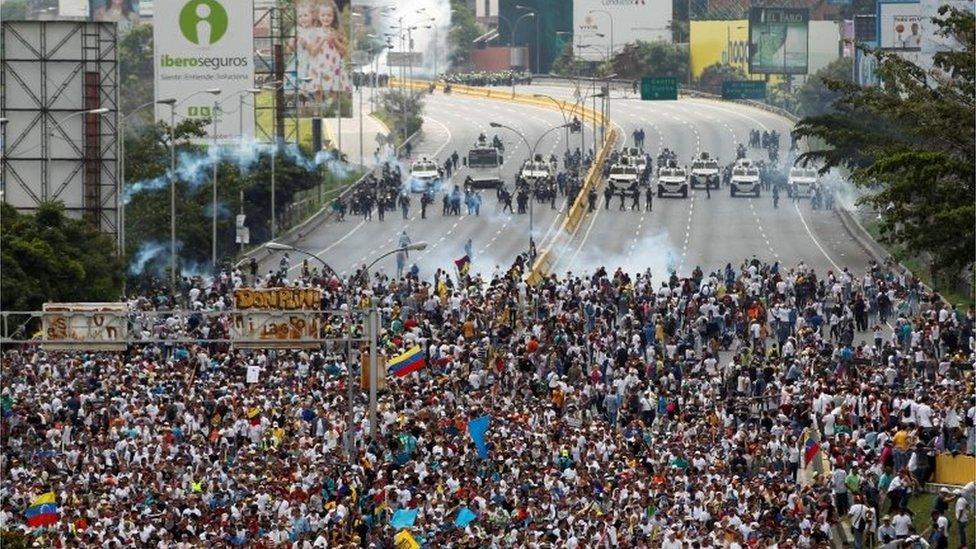
Anti-government protesters clashed with riot police in Caracas and in other cities
In the capital, Caracas, tens of thousands marched towards the Ombudsman's office from different points in the city.
Some of the marches turned violent, with protesters throwing stones and members of the security forces firing tear gas and rubber bullets.
Tens of thousands of government supporters also gathered for a rival rally in Caracas at which President Maduro spoke.
Who died and why?
Seventeen-year-old Carlos José Moreno was killed by a shot in the head in the centre of Caracas near an opposition demonstration.
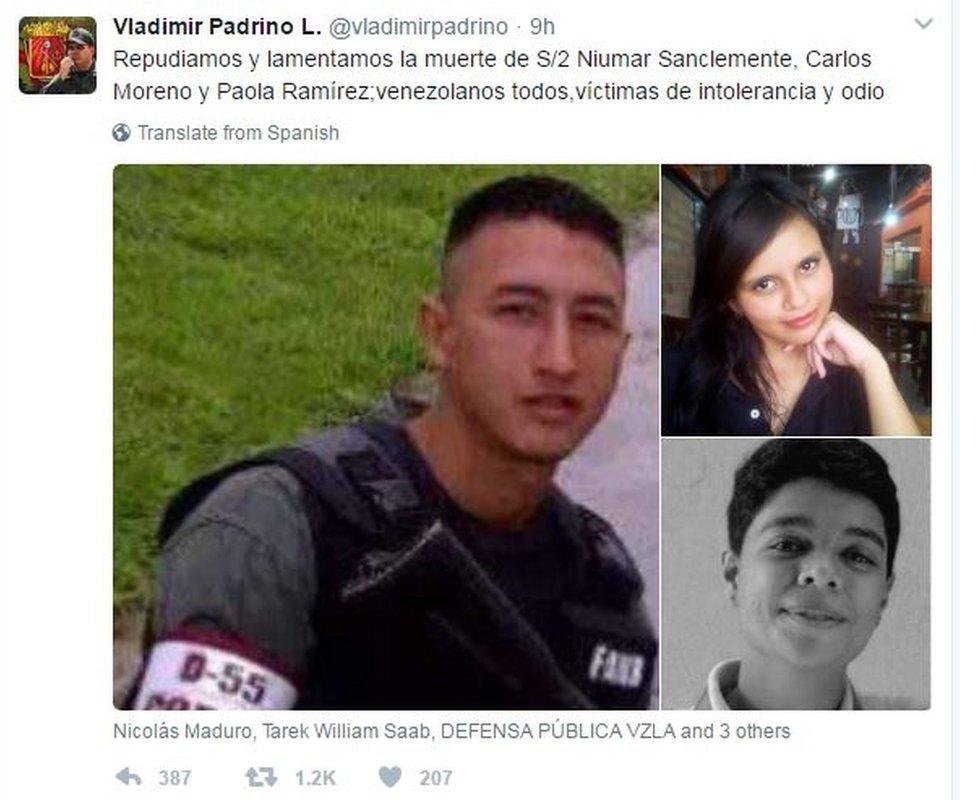
Defence Minister Vladimir Padrino tweeted a composite picture of the three victims saying he lamented and condemned their deaths
His brother said the teenager had not been attending the protest but was on his way to play football when he came across an opposition march and was shot dead.
Witnesses told Agence France Press news agency that the shots were fired by men on motorbikes, who also threw tear gas at the opposition march.
A 23-year-old student, Paola Ramírez, was shot dead in the city of San Cristobal, in western Venezuela.
Her boyfriend told Reuters news agency that they were chased by armed men on motorbikes as they were leaving an anti-government protest in the city, also on a motorbike.
Ms Ramírez was shot dead shortly afterwards at a square where she had been looking for her sister, her boyfriend said.
A member of the National Guard, Sergeant Niumar Sanclemente, was shot dead in Miranda state, ombudsman Tarek Saab tweeted.
He said that Sgt Sanclemente had been killed by a "sharpshooter" during an anti-government protest, where a National Guard colonel was also injured.
He did not give further details about who the sharpshooter may have been.
Who was behind the killings?
Witnesses in the killings of Mr Moreno and Ms Ramírez said that the shooters belonged to "colectivos", pro-government militant grassroots groups.
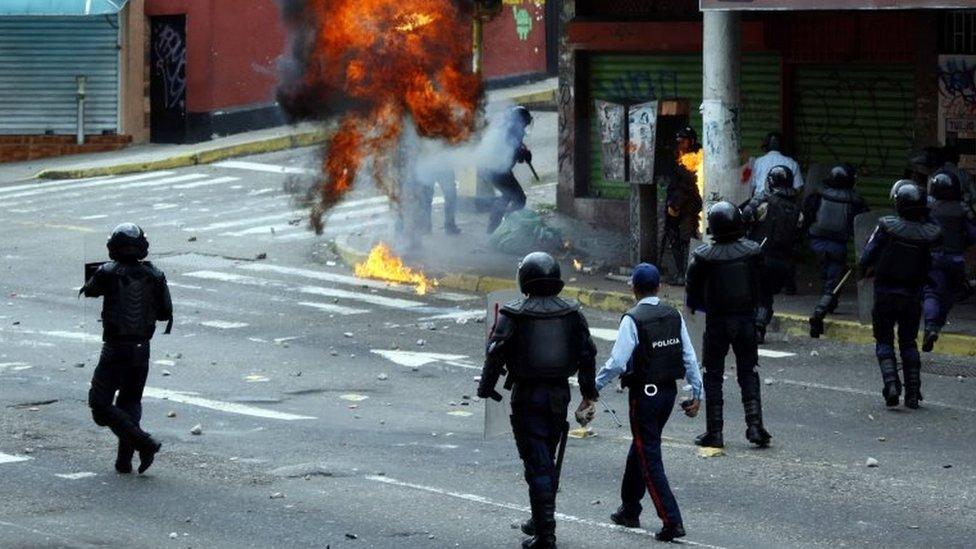
Police and protesters also clashed in San Cristobal
Members of the colectivos argue that they are defending President Maduro's socialist revolution from attacks from elitist and imperialist sectors of society.
But critics say their most hardline members are little more than thugs who intimidate anyone who thinks differently.
Vice-President Tareck El Aissami said opposition leaders who had called for the protests were to blame for the killings, in particular the president of the opposition-led National Assembly, Julio Borges.
"The person responsible [for the killings] is Julio Borges, as he has repeatedly spread his message of violence, hate and intolerance," Mr El Aissami said.
"He pushed one group of Venezuelans to confront another group of our countrymen."
Ombudsman Saab called for an investigation into all of the killings.
What else happened?
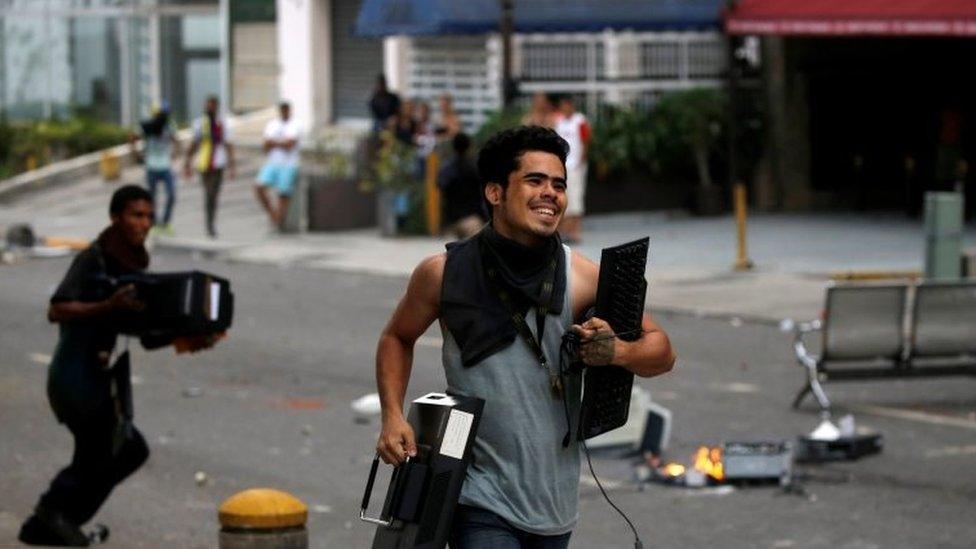
Looting was reported in Caracas
More than 50 people are reported to have been injured in the protests across Venezuela.
There were reports of shops being looted in western Caracas and more than 500 people were arrested according to figures compiled by a non-governmental group Foro Penal.
A pro-government rally in Caracas was attended by tens of thousands of people who cheered President Maduro and the deputy leader of the socialist PSUV party, Diosdado Cabello.
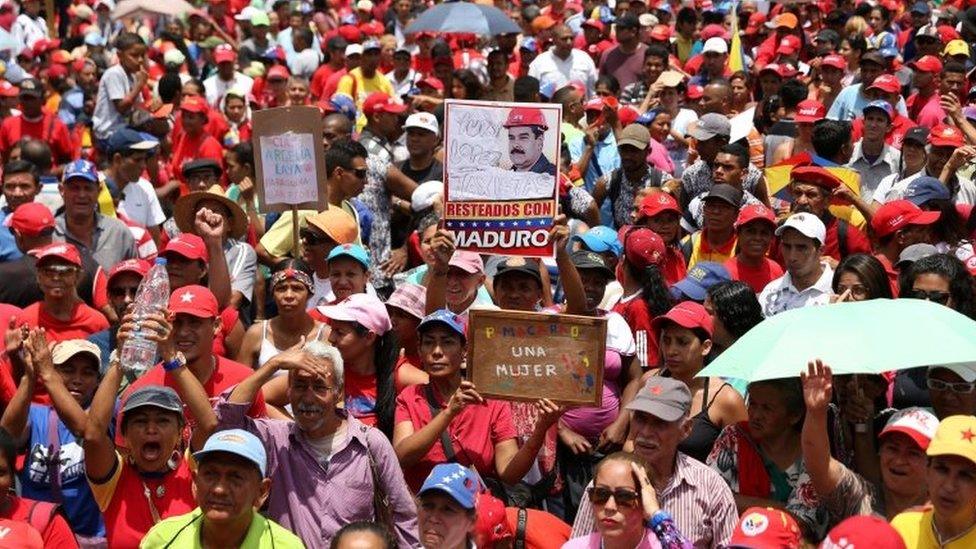
Government supporters were also out in force to show their loyalty to the "Bolivarian Revolution"
Mr Cabello praised the people who had come out to "defend the Bolivarian Revolution".
In a sign of heightening tension between the government and private enterprise, US car giant General Motors said that its Venezuelan plant in the city of Valencia had been "unexpectedly taken by the public authorities".
What do the anti-government protesters want?
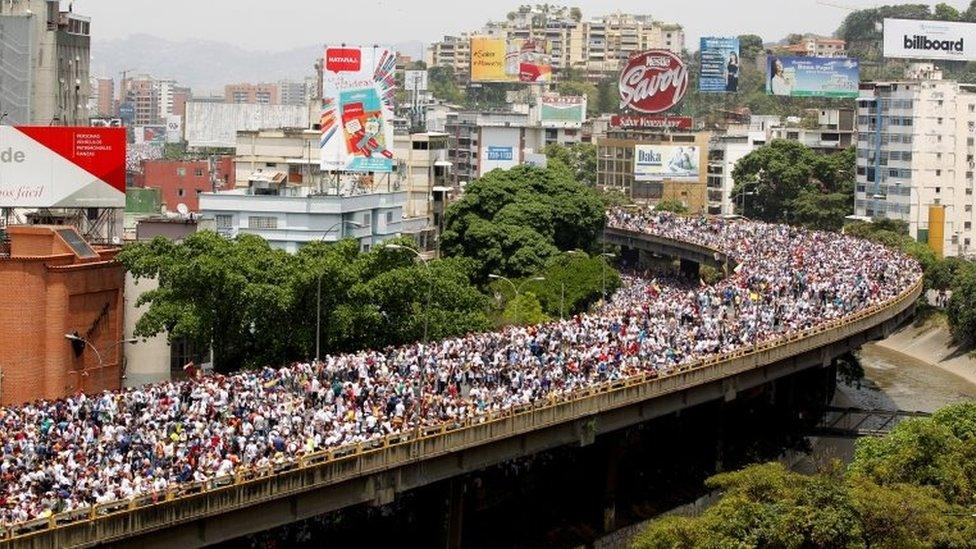
Anti-government protesters turned out in huge numbers in Caracas
They have four key demands:
Removal from office of Supreme Court justices who issued a ruling stripping the National Assembly of its powers (the ruling has since been revoked)
General elections in 2017
Creation of a "humanitarian channel" to allow medication to be imported to counter the severe shortages in Venezuela
Release of all the "political prisoners"
What will happen next?
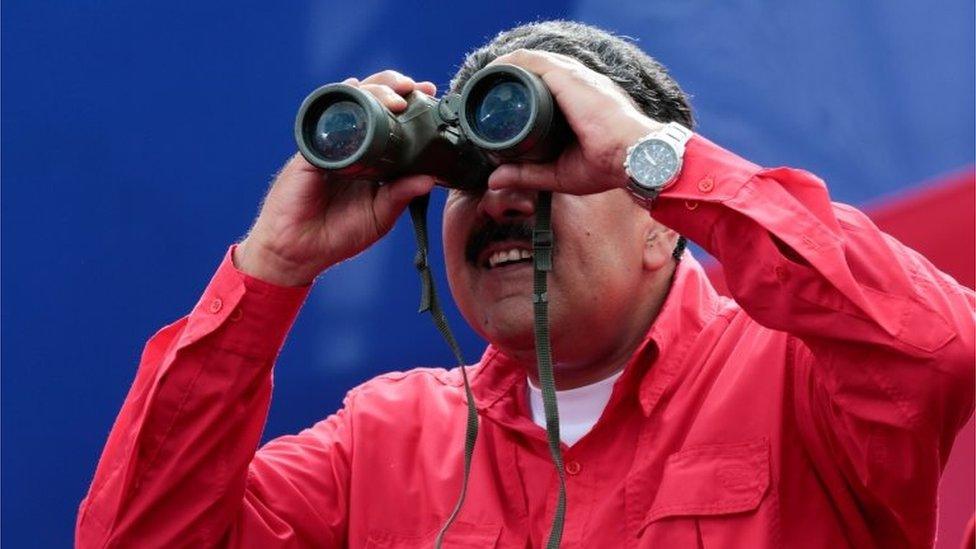
President Maduro will likely face more protests in the coming weeks
Opposition leader Henrique Capriles has called on Venezuelans to take to the streets again on Thursday,
He said that "millions" had protested on Wednesday and urged them to keep up the pressure on the government.
Opposition leaders want fresh elections to be held as they think the government is to blame for Venezuela's high inflation, rampant crime and shortages of basic goods.
The government and its supporters blame imperialist forces led by the United States for the dismal state of the economy and say they are victims of an "economic war" being waged against them.
They have vowed to "defend the Bolivarian Revolution".
As previous attempts at dialogue between the government and the opposition have failed it is hard to see fresh negotiations starting anytime soon.
The National Electoral Council could try to defuse the situation by setting a date for regional elections, which had originally been expected to be held last December.
But for the immediate future, belligerent rhetoric and protests are likely to continue.
- Published20 April 2017
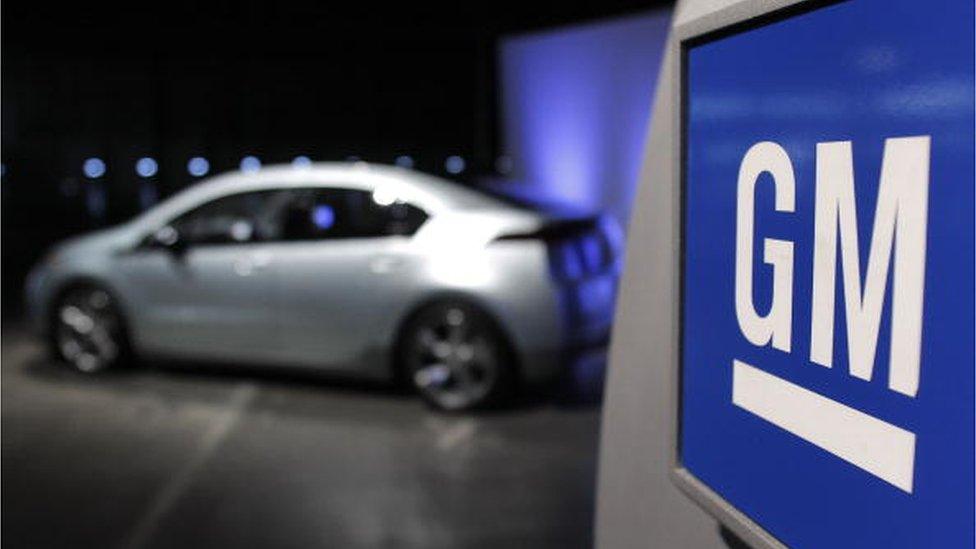
- Published12 August 2021
